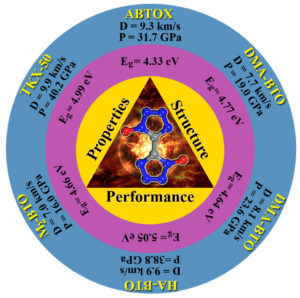From gunpowder to modern energetic materials, the so-called science of explosive research has renovated the potential capability to discover a wide range of novel energetic materials exclusively used in both military and civilian sectors. However, the controversial drama between the properties of energetic materials, namely, the power-safety contradiction, constitutes a great challenge in the design of new energetic materials. The desired energetic materials need to be balanced between these two inherently contradicting properties, which restricts their usage in practical applications, even though many energetic materials are synthesized every year.
In order to obtain a fine balance between the properties of energetic materials, we have studied how the microstructures and intermolecular interactions influence the macroscopic behaviour of explosives. With the help of large-scale clusters, a broad range of theory, modelling and simulations, we have been able to understand the potential capabilities of energetic materials for possible real time applications.
Most of the energetic solids that I have studied are molecular crystals held together by inter-molecular interactions. By smartly incorporating the energetic groups as proton acceptors, we could form the strong hydrogen bonding networks crucial for the construction of high energy density materials. As improved intra- and intermolecular interactions tightly pack the crystal and thereby reduces its volume, the density and stability of the energetic materials is enhanced. This is therefore a highly efficient strategy to improve the performance and stability of explosives. The main objective of our studies is to understand the fundamental physical and chemical properties and the thermodynamic equation of the state of energetic crystals.
My focus is on the understanding of various properties of solid energetic materials using van der Waals density functional methods, including van der Waals interactions, structural stability, pressure induced structural phase transformations and vibrational properties of green energetic materials. In our recent work on a series of 5,5′-bitetrazole-1,1′-diolate based energetic ionic salts, we were able to provide a precise correlation between intermolecular interactions and impact sensitivity of energetic materials, in combination with molecular stability that can be set as a base for molecular and crystal design. In 2018, this work was recognized as a HOT article published in PCCP (1) and more recently, our research demonstrating the importance of high pressure studies was published in RSC Advances (2). Overall, our approach may provide a fundamental knowledge in designing the next-generation explosives, propellants, and pyrotechnics prior to the actual experiments.
References:
- Moses Abraham, Vikas D. Ghule and G. Vaitheeswaran, Phys. Chem. Chem. Phys., 20, 29693, 2018
- Moses Abraham, RSC Adv., 2020,10, 24867-24876
About the Web Writer:
 Dr. B. Moses Abraham recently received his Ph.D from the University of Hyderabad, India. He obtained a Bachelor of Science degree from Noble College, Machilipatnam, which is one of the first four educational institutions opened in India by the British Government in 1843. Moses Abraham has been inducted as an Associate Member in Royal Society of Chemistry. His recent work on BTO-based energetic salts was recognized as HOT article for the year 2018 by Physical Chemistry Chemical Physics. He has received various prestigious travel grants including the Royal Society of Chemistry and Science and Engineering Research Board travel grants to present his research on international scientific platforms. You can find him on Twitter @mosesabrahamb.
Dr. B. Moses Abraham recently received his Ph.D from the University of Hyderabad, India. He obtained a Bachelor of Science degree from Noble College, Machilipatnam, which is one of the first four educational institutions opened in India by the British Government in 1843. Moses Abraham has been inducted as an Associate Member in Royal Society of Chemistry. His recent work on BTO-based energetic salts was recognized as HOT article for the year 2018 by Physical Chemistry Chemical Physics. He has received various prestigious travel grants including the Royal Society of Chemistry and Science and Engineering Research Board travel grants to present his research on international scientific platforms. You can find him on Twitter @mosesabrahamb.
 Submit to RSC Advances today! Check out our author guidelines for information on our article types or find out more about the advantages of publishing in a Royal Society of Chemistry journal.
Submit to RSC Advances today! Check out our author guidelines for information on our article types or find out more about the advantages of publishing in a Royal Society of Chemistry journal.
Keep up to date with our latest HOT articles, Reviews, Collections & more by following us on Twitter. You can also keep informed by signing up to our E-Alerts.











